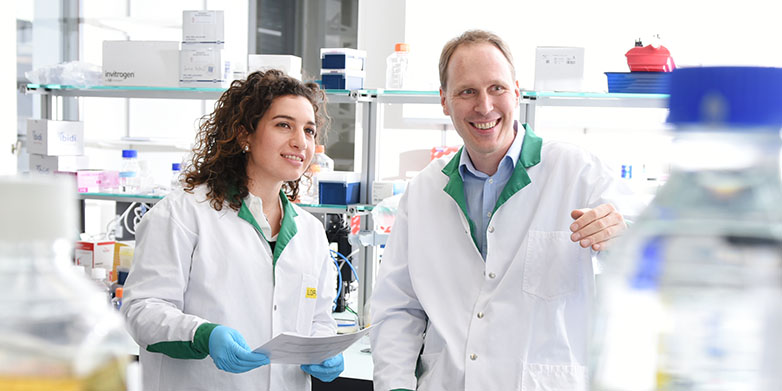The ETH department is well established in Basel
Ten years ago, ETH Zurich established its first and only department outside Zurich: the Department of Biosystems Science and Engineering in Basel. ETH will soon expand its outpost. The construction of a new department building on the Schällemätteli campus will bring it right next to the University of Basel.

Since it was founded, the Department of Biosystems Science and Engineering (D-BSSE) in Basel has focused on three areas: biology, engineering sciences and theory. Biologists conduct experiments on living organisms and cells, bioinformaticians and theorists analyse large data sets and model biological processes, and engineers develop tools to analyse and manipulate biological systems. Now the research community at the D-BSSE wants to work together even more closely; the different fields will interconnect even more, and researchers from all three areas will conduct collaborative experiments and find solutions together.
“Today, we can look back proudly on the successful formation and development of our department,” says Professor Timm Schroeder, the current head of the Basel-based ETH department. The D-BSSE began with seven professors and 150 employees. Today there are 19 professors with over 300 employees in total. In the ten years since it was established, nine start-ups have been developed through the department.
With its focus on systems biology and synthetic biology, the department has been perfectly suited to Basel from the start. “ETH Zurich was able to establish itself here at one of the world’s largest life sciences clusters, with first-class researchers and the giants of the pharmaceutical industry. As ETH researchers in Basel, we benefit greatly from being part of this community. Working in such an environment is extremely valuable and inspiring for our own research,” Schroeder says.
Collaboration with the industry
ETH President Lino Guzzella also sees ETH Zurich’s presence in Basel as essential. “Our department in Basel closely connects us to strategically important partners in research and business. The Basel site ensures that ETH Zurich has access to one of the largest European research cluster in the life sciences.”
Medicine is one of the priorities at ETH, which is why the University is introducing a new Bachelor’s programme in medicine in autumn 2017. “Collaboration with the university institutions in Basel and the pharmaceutical industry is thus of the utmost importance for ETH Zurich to promote the transfer of our medically relevant research to business and clinical practice,” emphasises the ETH President.
The D-BSSE would also like to forge closer links to the medically relevant pharmaceutical industry. In addition, existing collaborations with the University of Basel and University Hospital Basel will be expanded; for example, for the development of patient-specific therapies. “Personalised medicine, data science, molecular systems engineering and basic research – these are the four strategic priorities for the D-BSSE over the next year,” says Professor Schroeder.
New department building
To create optimal conditions for the implementation of this strategy, a new department building will be built on the Schällemätteli campus in Basel. All the D-BSSE research groups will once again be united under one roof: at present, a lack of space in the current building means that some groups have been housed in neighbouring buildings on the Rosental campus.
The new building will be a modern research centre that – thanks to its location on the University of Basel campus – will offer the optimal conditions for collaborations in biomedicine between ETH Zurich, University Hospital Basel and the University of Basel. The building is expected to be ready for use in 2021.

Comments
No comments yet